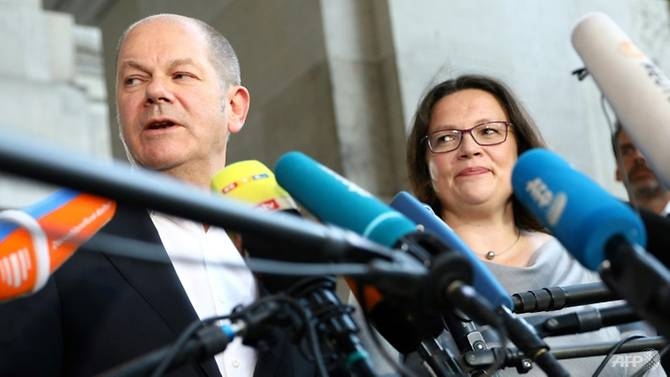German coalition parties agree tougher migrant policy: SPD chief
 |
| Germany's finance mnister and vice chairman of the Social Democratic Party (SPD) Olaf Scholz (L) and leader of the Social Democratic Party (SPD) Andrea Nahles give a statement after a meeting of the coalition parties reached an agreement on asylum policy AFP/Omer MESSINGER |
At the end of a month-long dispute, Merkel's three-party coalition agreed to a compromise under which the number of asylum-seekers in the country will be reduced.
The parties in power - Merkel's centre-right CDU, the hardline conservative Bavarian CSU ally and the centre-left Social Democrats (SPD) - agreed on a "reorganisation of asylum policy" in Germany, SPD chief Andrea Nahles said after a summit meeting in Berlin, adding that it was a "good solution".
The SPD had earlier declined to endorse new policies put forward by Merkel in a bid to put down a rebellion by Interior Minister Horst Seehofer of the CSU.
In high-stakes crisis talks overnight Monday to Tuesday, Merkel advocated tightening border controls and setting up closed "transit centres" to hold migrants on the Austrian frontier.
But the deal, which essentially amounted to an about-turn in Merkel's liberal refugee policy, immediately sparked resistance from Germany's neighbours as well as the SPD.
Merkel's decision in 2015 to open Germany's borders to asylum-seekers, many fleeing war in Syria and Iraq, has deeply divided the country and its neighbours.
Since then, popular misgivings over the migrant influx have given populist and anti-immigration forces a boost across several European nations, including Italy and Austria where far-right parties are now sharing power.
The simmering resentment in Germany erupted in June when Seehofer threatened Merkel with an ultimatum to curb arrivals, sparking the worst political crisis of her government of just barely 100 days.
What the stars mean:
★ Poor ★ ★ Promising ★★★ Good ★★★★ Very good ★★★★★ Exceptional
Related Contents
Latest News
More News
- Russian President congratulates Vietnamese Party leader during phone talks (January 25, 2026 | 09:58)
- Worldwide congratulations underscore confidence in Vietnam’s 14th Party Congress (January 23, 2026 | 09:02)
- Political parties, organisations, int’l friends send congratulations to 14th National Party Congress (January 22, 2026 | 09:33)
- 14th National Party Congress: Japanese media highlight Vietnam’s growth targets (January 21, 2026 | 09:46)
- 14th National Party Congress: Driving force for Vietnam to continue renewal, innovation, breakthroughs (January 21, 2026 | 09:42)
- Vietnam remains spiritual support for progressive forces: Colombian party leader (January 21, 2026 | 08:00)
- Int'l media provides large coverage of 14th National Party Congress's first working day (January 20, 2026 | 09:09)
- Vietnamese firms win top honours at ASEAN Digital Awards (January 16, 2026 | 16:45)
- ASEAN Digital Ministers' Meeting opens in Hanoi (January 15, 2026 | 15:33)
- ASEAN economies move up the global chip value chain (December 09, 2025 | 13:32)

 Tag:
Tag:




















 Mobile Version
Mobile Version